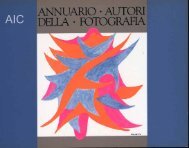ITALIANA - AIC Associazione Italiana Autori della Fotografia ...
ITALIANA - AIC Associazione Italiana Autori della Fotografia ...
ITALIANA - AIC Associazione Italiana Autori della Fotografia ...
Create successful ePaper yourself
Turn your PDF publications into a flip-book with our unique Google optimized e-Paper software.
sa<br />
<strong>AIC</strong><br />
LUCIANO * •<br />
0 0 rer un equivoco<br />
in meno<br />
"Che ora è" La fotografia è pittura? La<br />
fotografia deve ispirarsi alla<br />
pittura? Più preciso è il<br />
riferimento alla pittura più<br />
grande è il valore <strong>della</strong><br />
fotografia?<br />
Is photography painting? Should, photography draw its inspiration from<br />
painting? Is it true that the more directly photography refers to painting,<br />
the greater its meaning?<br />
A deliberate over simplification in the above questions conceals a<br />
misunderstanding of photography's function that occurs continually: the<br />
belief that photography, because it is created with a "mechanical"<br />
technique, should in some way be subordinate to painting; and that<br />
Directors of Photography should constantly draw their inspiration from<br />
that same painting.<br />
I believe, instead, that cineastes in general, and this includes Directors of<br />
Photography, should draw the inspiration for their very responsible task<br />
of creating Cinema, from life.<br />
The various kinds of light and different atmospheres one can perceive in<br />
real life, have already been interpreted in painting. Attempting to<br />
reproduce the effect created by a painter, in a vain attempt to give a film<br />
some class with in arty touch, can be dangerous, for three reasons:<br />
Firstly, because, at the most, you are only copying another's creation, even<br />
if it might earn you a lot of praise.<br />
Secondly, because you are proposing an image that is false, in the sense<br />
that it is based on one that has already been created.<br />
Thirdly, because you deny your eyes the possibility of seeing and<br />
studying the life around you, and yourself the possibility of<br />
communicating it by interpreting it according to your particular<br />
sensitivity; therefore, probably failing in the species of moral obligation,<br />
prior to your professional commitment, that is implied in choosing to<br />
create Cinema.<br />
Cinema that is a documentation, even if profoundly elaborated, of real life.<br />
It is enough to have the chance to frequent a few painters, using different<br />
L'eccessivo e volontario<br />
semplicismo delle domande<br />
nasconde un ricorrente<br />
equivoco: che la fotografia debba<br />
essere in qualche misura schiava<br />
<strong>della</strong> pittura in quanto più<br />
meccanica, e che dalla pittura i<br />
direttori <strong>della</strong> fotografia debbano<br />
trarre costante ispirazione.<br />
Credo piuttosto che i cineasti in<br />
genere, e fra questi anche i<br />
direttori <strong>della</strong> fotografia, nello<br />
styles and each with their own particular value, to realize that, asfar as<br />
they are concerned, the above situation is reversed, and the Cinema is,<br />
fact, very important to them, especially as regards the pure<br />
cinematographic image. Many painters even find the wealth of "trompe<br />
I'oeil" images used inT.V. commercials very stimulating.<br />
Besides this, a great number of painters work with a camera, before they<br />
even pick up a brush!<br />
So, let's not feel inferior.<br />
Well, am I perhaps trying to say that Directors of Photography should<br />
show no interest in painting and cultivate their ignorance?<br />
Certainly not Instead, I believe that they should frequent museums,<br />
galleries and exhibitions assiduously as, determining the differences, the<br />
particular qualities — the "specifics", as they were once called — of the<br />
various expressive forms, is a stimulating intellectual adventure that<br />
surprises you at every turn, and, it is precisely through determining these<br />
somewhat "démodé" specifics that you can possibly avoid<br />
misunderstandings which, in truth, are banalities and, therefore,<br />
widespread, and which, unfortunately, are fostered by critics and public<br />
alike.<br />
A plethora of socalled "pictorial" effects will often be mistakenly<br />
acclaimed by the majority as extraordinarily beautiful photography. And<br />
even though the content of the film might be obscured by this visual<br />
embellishment, employed in the name of instant success, very few people<br />
will actually be aware of this<br />
In the name of the above principles, which I consider sacrosanct, I<br />
recently visited the Metropolitan Museum of Art in New York. While I was<br />
wandering through the various "rooms", past collections that, apart from<br />
individual works that are often of enormous value, generally reflect the









